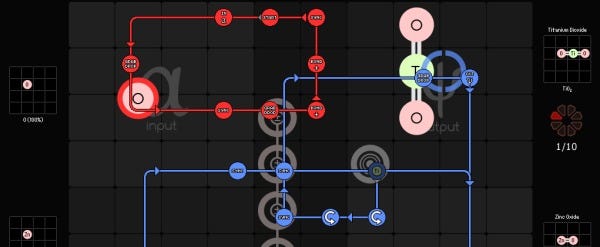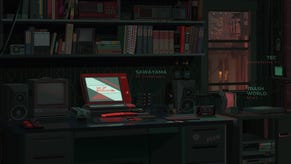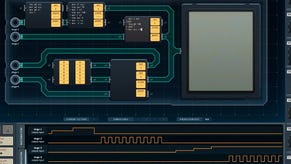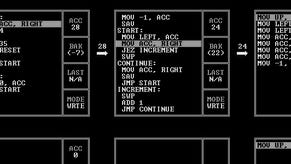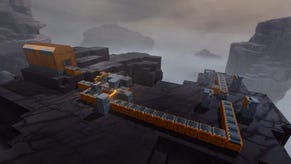Wot I Think: SpaceChem
When I posted about indie puzzler SpaceChem last week, I wondered if we already had one of the year’s best indie games on out hands. Since then I’ve lost many hours to its incredible chemical conundrums, and I’m very excited to tell you Wot I Think.
Before we start this review, the first thing you need to do, right now, is ditch any preconceptions you’ve made off the back of SpaceChem’s chemistry-related imagery, or the fact that the screenshots look, at worst, like educational software. I can guarantee that you will learn almost nothing of any value, scientific or otherwise, playing this game. Your leisure hours are safe. If I have any chemists reading this, I can also guarantee that you’ll suck at SpaceChem as much as the rest of us. Sorry, chemists.
In SpaceChem you play a new employee of a profoundly sinister interstellar chemical company (called SpaceChem), with the story of your career being told throughout the game through well-written text vignettes. The actual game of SpaceChem is, quite simply, building circuits. Using an intuitive and satisfying interface, you whip up tracks for chemicals to travel down with the objective of carrying an entirely different chemical to the level’s ultimate destination.
At its simplest, let’s say a level provides you with oxygen atoms and expects you to build a circuit that produces a molecule made from two oxygen atoms bonded together (O2). That means you need to build a circuit which collects an oxygen atom, drops it off at the bonder, goes back and collects a second oxygen atom, takes it to the bonder, bonds the two atoms together, then drops the finished molecule off at the level’s output area.
That would look like this:

Starting from the big red circle, those smaller red circles are:
(1) Start
(2) Input zone alpha (causes whatever the level's input atom or molecule is to be called in- in this case, oxygen)
(3) Grab (this square is where the "input" atom appears, so this instruction causes the oxygen atom we called in to be picked up)
(4) Drop (causes the oxygen atom to be dropped on this grey circle, a bonder)
(3 again) Grab again. See, I've just noticed I forgot to put a second "Input zone alpha" prior to this, so this would actually cause my circuit to grab at nothing at all. I screwed up. THAT IS THE KIND OF GAME THIS IS. We'll continue as if I hadn't screwed up.
(5) Bond! This would activate any bonders on the map, causing the oxygen atom I'm carrying to bond with the one I dropped directly below.
(6) Drop completed O2 molecule on this, the output zone.
(7) Activate output zone! Any molecules on the output zone now vanish.
See how it links up with itself at the end? That’s vital. You actually need to drop off dozens of finished molecules to complete a level, so anything you design must be able to run ad infintum. Unless you’ve made a hash of a level and are just praying you complete the objective before your machine breaks down spectacularly, but more on that later.
Now, something slightly more complex. Let’s say a level gives you silver and fluoride via two separate entrances, and wants you to bond them into silver fluoride. You actually have two circuits you can run through each level, one red and one blue, so if you used them together, one to drop off the fluoride and the other to bond it with the silver, your circuit would look like this:

Putting these tracks together is absurdly satisfying. It’s not just the pleasant clicking sound as you slip each new piece into place- realisations as to how to make the machine more efficiently, or precisely how to solve a problem bring on a sensation of deep joy, as does watching the completed machine run. When you finish a right bastard of a level, you’ll find yourself watching it tick for whole minutes. It’s the most satisfying thing in the world.
I should point out here that the above levels are simply how SpaceChem starts. Before long you’re knitting together tremendous knots of circuitry, the game having bonded itself with your brain, and the moment you think you’re starting to get the hang of things it introduces a new piece of machinery to pull the rug out from under you. Check this out:

That’s me breaking down double-bonded oxygen molecules and triple-bonded nitrogen molecules like a pro. Since both types arrive at random in the same zone, I’m using a scanner to send the oxygen one way and the nitrogen another. Laying that out again and again, gradually zeroing in on the solution, took me 40 minutes, and I loved every second of it.
Now you’ve got your head around that, I’ll move on to SpaceChem’s coup de grâce. On most levels, each of these circuits are only part of the puzzle because you can’t possibly turn the elements you receive into ones you need in the small space provided. Instead you position multiple factories, each containing a circuit hand-designed by you, and link them all up with pipelines. The result is something as absorbing as molten lava, and it looks like this:

This is where that "Hoping your machine runs until it breaks" enters the equation (jk). If certain elements (JK) of your process run faster than others, pipes can get backed up, and the moment a factory can't output chemicals from its output zone you inevitably get a collision, ending the simulation. It's possible to deliberately slow circuits down, but figuring out how is yet another puzzle.
A friend of mine once pointed out to me that good puzzle games make you feel smart, and the best puzzle games provide a sort of double-blow whereby first of all you feel smart, and then you’re filled with a feeling of respect for how smart the puzzle itself was.
By this criteria, SpaceChem could be the best puzzle game I’ve ever played. You never stop feeling awed by the game’s design, and when you complete a level you feel like some kind of floating, untouchable genius, not fit to eat the food of mortals. On the subject of eating, some of SpaceChem’s more challenging levels taught me that it is, in fact, possible to think yourself sick. I was so involved in these puzzles and found each breakthrough so rewarding yet so utterly draining that I started to feel nauseous. How’s that for a sales pitch?
But facetiousness aside, SpaceChem’s difficulty fast becomes quite intimidating, and I’m sure that lots of people playing the game will end up discovering a glass ceiling relating to their patience, perseverance and honest-to-god mathematical intelligence. Personally, I started getting exhausted at the prospect of what I was expected to do about twelve hours in- long after I’d gotten my $20’s worth, but not even half-way through the game's levels. I’m sure I could press on if I just clicked the SpaceChem icon sat on my desktop, but that’s genuinely daunting. It's the mental equivalent of trying to get yourself out of the door to go for a run.

It wouldn’t be quite right to call this difficulty a flaw of SpaceChem’s, because I’m sure the difficulty curve will be as appealing to certain nerdy gamers as it will be off-putting to others. A feature that will please everyone, though, is the powerful replayability of every single puzzle.
Whenever you complete a level a series of simple graphs show up detailing how fast your solution was compared to everybody else, and the same for number of components used. Your solutions are all stored by the game, so returning to your old machines to strip them down and replace convoluted mechanisms with elegant ones couldn’t be simpler. Inevitably you’ll end up creating new problems for yourself along the way, and you’ll have to come up with some new solutions. Which is the beauty of SpaceChem’s large-scale levels- depending on your chosen arrangement of factories and processes, you end up creating your own puzzles. I'd bet that the problems I was struggling with on the last level I played are nothing at all like what the next guy went through.
I’ve probably been talking about mechanics and molecules for long enough that you've forgotten that this is still a game with a story. Not only that, though, it’s a game with heart. Love has gone into every aspect of SpaceChem, from the writing and menus to the pacing and various dark surprises that litter the game. The music is exceptional, too- dramatic and confident enough to transform your confusion over why your machine won’t work into a heroic, almost defiant act.
In short, my initial impressions were right. This is an incredible game, and it absolutely has a place in the PC’s growing catalogue of glorious indie puzzlers. Alongside the shimmering, yet evasive brilliance of Braid, or the charming wit of World of Goo, we now have a straight-up genius. There’s no other word for it- like all geniuses, it can be demanding and even problematic, but there’s no questioning what Zachtronics has achieved here. This is top-of-the-line entertainment. If you’re a puzzle game fan, buy SpaceChem immediately. Everybody else should place $20 under a rock or something and download the demo, so that you will have $20 should you realise that you need the full version. I am telling you to place your money under a rock for this game.
Do it!
